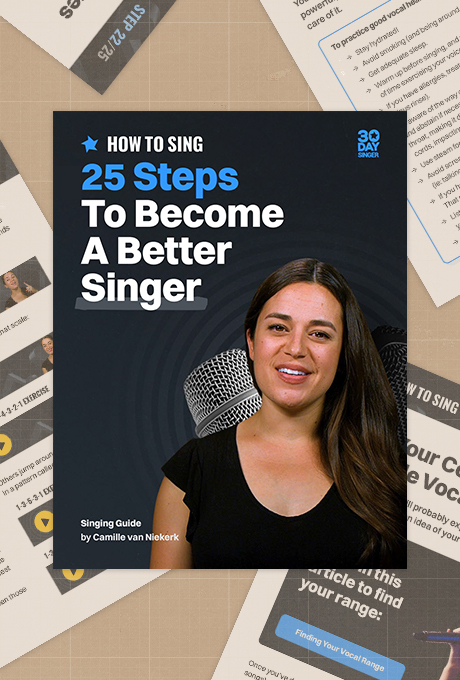Getting better fast: when will I hear improvement in my voice?
April 27, 2020By Camille van Niekerk
It’s a great question, and one that many new students ask. This article will give you some guidelines for realistic expectations!
When can I expect to hear results?
It depends on what you mean by “results”! There’s no magic vocal exercise or mental trick to “transform” your voice. All vocal “skills” are just coordinations between your brain and body, similar to any other physical skill.
Most people, when they ask that question, want to hear a dramatic difference in their tone, or a huge expansion in their range, or the ability to “belt” high notes with ease.
Here’s the truth: improving your tone involves skillfully adjusting your articulators, including your soft palate, tongue, jaw, and lips, on top of singing with good breath support and healthy cord closure. Range extension is similar to stretching: your vocal folds must be trained to continue vibrating while they elongate, and many times, vowel modification needs to take place at the upper and lower extremes of your range. Belting requires excellent breath support, body engagement, cord compression, vowel modification and relaxation to avoid strain or damage. None of those skills appear overnight! They take dedicated practice.

Learn about how to extend your range with this lesson!
With that said, you should absolutely begin to hear more consistency with your voice as you get into the habit of daily vocal exercise. You should hear a difference in your tone when you employ proper vowel modification, when you sing with a relaxed jaw, when you lift your soft palate to create more resonant space, or when you use a recommended exercise to achieve a specific purpose (like finding your mixed coordination with a NYAH exercise or increasing your cord closure with a GUH exercise).
The more specific your goals are, the easier it will be to track your progress. If your goal is just to “sound better”, how will you know when you’ve achieved it? “Better” is subjective!
It’s frustrating and disheartening to put time into practicing and not hear results. We know that. We also know that you will increase your vocal ability with dedicated practice. Each lesson has a specific focus, with exercises to help you improve on that skill. Knowing why you’re doing a certain exercise is key to your success, and it’ll help you track your progress as you go! If you ever have questions about which exercises to use for a specific goal, or what the purpose of a specific exercise is, please feel free to ask in our instructor-moderated forum!
We also encourage you to record yourself and listen back. Very few people like the sound of their own voice at first (including professional singers!), but it’s really helpful to help refine your goals and hear the results you’re working for.
Here are some elements and goals you can track as you go along:
• Comfortable range: note your highest and lowest comfortable pitch at the start of the program, and see how you gradually increase that range
• Tone: was your untrained tone overly nasal, or overly dark? How has it changed, as you’ve learned to adjust your jaw, soft palate, and amount of compression?
• Vowels: have you achieved a more consistent tone when changing from one vowel to the next? Have you learned how to modify vowels for the best possible tone?
• Registration: can you find (and comfortably sing in) your chest voice and head voice? Are you starting to identify mixed registration?
• Posture: are you maintaining good posture when you sing?
• Breath support: are you able to sustain pitches for longer than before?
Those are just a few ideas! If you every feel stuck, or you don’t know which exercises to use to train a specific skill, ask a question on our forum or book a live lesson with an instructor for individual feedback.
I really want to get better fast. How can I speed up my progress?
There’s truly no benefit to rushing through the beginner course - we promise! In fact, we’ve heard the opposite from students who rushed through: they watched several lessons per day, hoping to get better FAST, and they ended up disappointed and vocally fatigued. As we’ve mentioned, the skills and coordinations that make up vocal technique take time like any other skill. But those same students - the ones who tried to fit a 30-day course into less than a week - tried it again, spacing out their lessons, and are now seeing the progress they were hoping for.
To progress as quickly as possible, we recommend rounding out your practice time with more than just singing. Incorporate ear training and active listening into your practice! See below for more specifics on how to do that, from another article for beginners: ‘One lesson per day? How to practice for the best results’.
What should my daily routine look like?
Most importantly: get into the habit of exercising your voice every day. A complete warmup/exercise routine can be about 10-15 minutes and should start with easy, gentle exercises like lip trills, humming, or singing on an NG. You want to gradually open up to syllables that start with a consonant (like MUH or NO), and end with open vowels. It’s okay if you don’t always follow this format, but your warmup (and singing in general) will be easier if you start with gentle, closed exercises (including lip trills, MM, NN, singing through a straw, etc). You can find a variety of warm-up routines on our warm-up page! Day 2 of the 30-day beginner course also contains a complete, gentle warmup you can use daily.
Once you’re warmed up, you can follow along with a new lesson video. If you want more practice on that specific skill, feel free to repeat the exercises within that video.
If you have more time and want to keep practicing, here are a few ideas:
1. Active listening + analysis: listen to your favorite singers to analyze their style and technique. Look for live performances (no lip syncing!) and take note of their posture, mouth shape, vowels, etc.
2. Listen to music from different genres: there’s something to learn (and hopefully something to like) in every style of music! It can be especially instructive to listen to the artists your favorite singers have cited as their influences, and see if you can hear similarities.
3. Train your ears: to start out, use a virtual keyboard to get a reference pitch and see if you can match that pitch. See how close you can get with a chromatic tuner. We like https://www.harpkit.com/online-tuner and https://tuner.ninja/.
4. Consider using an app like SingSharp (android + iPhone), PerfectPitch (iPhone only), or a karaoke app like Smule (android + iPhone), to analyze your pitch accuracy as you sing.
For beginners especially: pay attention to how your voice feels! If you’re experiencing vocal fatigue, cut back on your vocal use and incorporate more listening into your routine as you build stamina. And if you’re ever experiencing a sore throat, please rest your voice! Return to singing when you feel healthy.
Final thoughts:
As with any new skill, you can expect the best results with focused practice in shorter sessions, over a longer period of time. For example: ten minutes a day for one week will produce better results than a single 70-minute session once a week. The more often you return to new skills and coordinations, the easier they sink in and start to become second nature.
That’s our ultimate goal: training healthy technique as we grow our skills so that healthy technique becomes muscle memory. That’s how we prevent injury AND ensure that even in a high-stress situation (like an audition or performance), our body will know what to do. So while it’s true that building muscle memory takes time, good singing technique can benefit you for the rest of your life.
Best of luck, and happy practicing!


